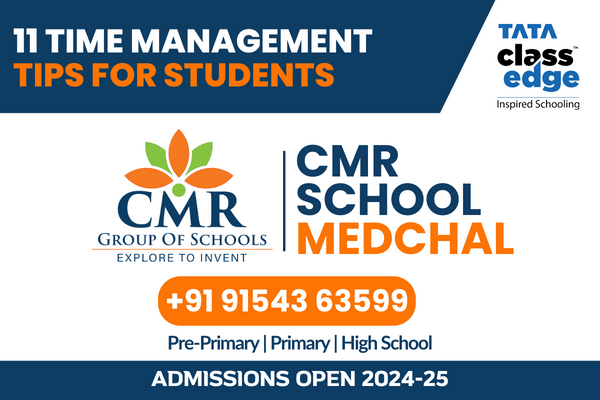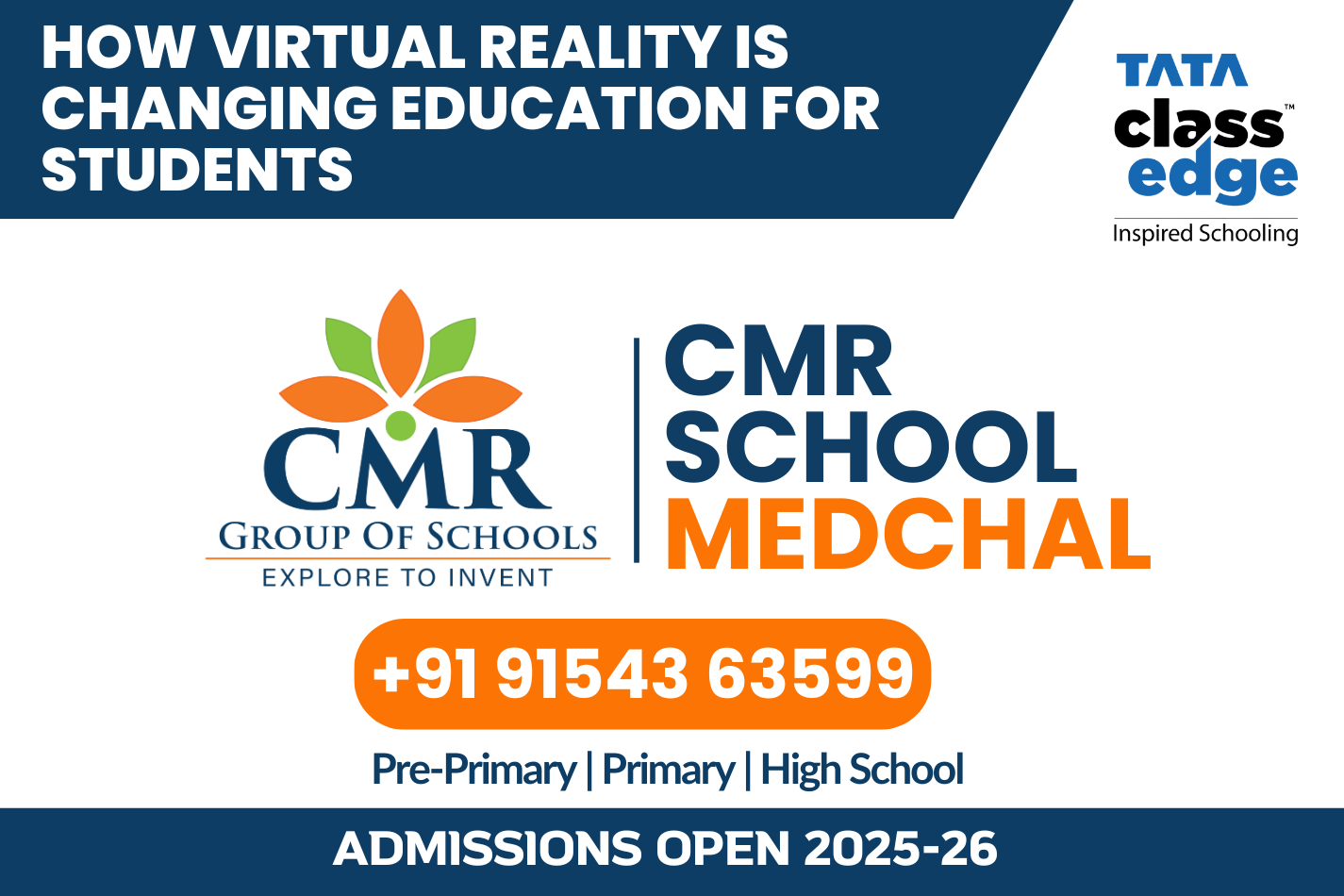Time management is a crucial skill for students to master as it helps them balance academic responsibilities, extracurricular activities, and personal commitments effectively. At CMR School Medchal, we understand the importance of time management in students’ academic success and overall well-being. In this article, we’ll explore 11 practical time management tips to help students optimize their study routines and achieve their goals.
1. Set Clear Goals and Priorities
Start by setting clear academic and personal goals, both short-term and long-term. Identify your priorities and allocate time accordingly to focus on tasks that align with your goals. Breaking down larger goals into smaller, manageable tasks can help you stay organized and motivated.
2. Create a Daily Schedule
Develop a daily schedule or timetable that outlines your activities, classes, study sessions, and extracurricular commitments. Use a planner, calendar, or digital tools to keep track of your schedule and set reminders for important deadlines and events. Stick to your schedule as much as possible to establish a routine and maximize productivity.
3. Use Time Blocking Techniques
Practice time blocking, where you allocate specific time blocks for different tasks or activities throughout the day. By dedicating uninterrupted periods of time to focus on specific tasks, you can minimize distractions and improve concentration. Prioritize important tasks and allocate sufficient time for studying, assignments, and revision.
4. Break Tasks Into Manageable Chunks
Break down larger tasks or projects into smaller, more manageable chunks to avoid feeling overwhelmed. Set achievable milestones or goals for each task and focus on completing one task at a time. Celebrate your progress and accomplishments along the way to stay motivated and maintain momentum.
5. Avoid Procrastination
Procrastination can be a major obstacle to effective time management. Identify common triggers for procrastination, such as fear of failure, perfectionism, or boredom, and develop strategies to overcome them. Break tasks into smaller steps, set deadlines for yourself, and use techniques such as the Pomodoro Technique to work in focused bursts.
6. Learn to Say No
Be selective about your commitments and learn to say no to activities or obligations that do not align with your goals or priorities. Prioritize your time and energy on activities that contribute to your personal and academic growth. Set boundaries with friends, family, and extracurricular activities to avoid overextending yourself.
7. Take Regular Breaks
Allow yourself to take regular breaks during study sessions to prevent burnout and maintain focus. Incorporate short breaks into your schedule to rest, recharge, and rejuvenate your mind and body. Use breaks to engage in relaxation techniques, physical activity, or hobbies that help you unwind and reduce stress.
8. Develop Effective Study Strategies
Experiment with different study strategies and techniques to find what works best for you. Use active learning methods such as summarizing, self-testing, and teaching others to reinforce your understanding of course material. Utilize mnemonic devices, mind maps, and visual aids to enhance memory retention and recall.
9. Stay Organized
Keep your study space, materials, and digital files organized to minimize distractions and streamline your workflow. Use folders, binders, and labels to categorize and store notes, textbooks, and reference materials. Keep your digital workspace clutter-free and use productivity tools such as to-do lists and task management apps to stay organized.
10. Seek Help When Needed
Don’t hesitate to seek help from teachers, tutors, classmates, or academic support services when you encounter challenges or need clarification on course material. Reach out for assistance early if you’re struggling with a particular subject or assignment to prevent problems from escalating. Asking for help is a sign of strength, not weakness.
11. Practice Self-Care
Prioritize self-care and well-being to maintain a healthy balance between academics and personal life. Get enough sleep, eat nutritious meals, exercise regularly, and engage in activities that bring you joy and relaxation. Taking care of your physical and mental health is essential for sustained academic success and overall happiness.
By implementing these 11 time management tips, students can enhance their productivity, reduce stress, and achieve their academic goals effectively. At CMR School Medchal, we are committed to supporting students in developing essential life skills such as time management to succeed in school and beyond.
FAQ’s :
- What is time management, and why is it important for students?
Time management refers to the ability to plan and organize one’s time effectively to accomplish tasks and achieve goals. It is important for students as it helps them prioritize tasks, avoid procrastination, maximize productivity, and balance academic and personal commitments. - How can students improve their time management skills?
Students can improve their time management skills by setting clear goals, creating schedules or timetables, using time blocking techniques, breaking tasks into manageable chunks, avoiding procrastination, and practicing self-discipline and self-care. - What are the benefits of effective time management for students?
Effective time management benefits students by reducing stress, increasing productivity, improving academic performance, enhancing focus and concentration, fostering a sense of accomplishment, and providing opportunities for personal growth and development. - What are some common time management challenges faced by students?
Common time management challenges faced by students include procrastination, lack of organization, difficulty prioritizing tasks, distractions from technology or social activities, overcommitment to extracurricular activities, and unrealistic expectations. - How can students balance academic responsibilities with extracurricular activities and personal commitments?
Students can balance academic responsibilities with extracurricular activities and personal commitments by prioritizing tasks, creating flexible schedules, learning to say no to non-essential activities, delegating tasks when possible, and practicing effective time management strategies. - Are there any tools or resources available to help students improve their time management skills?
Yes, there are many tools and resources available to help students improve their time management skills, including planners, calendars, mobile apps, online tutorials, workshops, and academic support services offered by schools or universities. - What should students do if they feel overwhelmed by their workload or deadlines?
If students feel overwhelmed by their workload or deadlines, they should take a step back, prioritize tasks, break them down into smaller steps, seek support from teachers or classmates, and practice stress management techniques such as deep breathing or mindfulness exercises. - How can parents support their children in developing effective time management skills?
Parents can support their children in developing effective time management skills by providing guidance, encouragement, and positive reinforcement, creating a conducive study environment at home, modeling good time management habits, and offering practical tips and strategies. - What are some time management tips specifically tailored for exam preparation?
Some time management tips specifically tailored for exam preparation include creating a study schedule, breaking down study materials into smaller chunks, using active learning techniques, setting realistic goals, practicing past exam papers, and taking regular breaks to avoid burnout. - How can students maintain their time management skills in the long term?
Students can maintain their time management skills in the long term by practicing consistency, reviewing and adjusting their strategies as needed, seeking feedback on their performance, reflecting on their progress, and continuously striving for improvement.
Admissions are now open for the 2024-25 academic year at CMR School Medchal. Contact us today to enroll your child and provide them with a comprehensive education that fosters personal growth, academic excellence, and lifelong success.
For admissions, contact us at +91 9154363599 or visit www.cmrschool.in.



